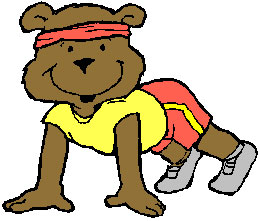 This WebMD Feature by R. Morgan Griffin and reviewed by Hansa D. Bhargava, MD offers that you know exercise is good for kids’ bodies. Did you know that exercise is crucial for kids’ developing brains as well?
This WebMD Feature by R. Morgan Griffin and reviewed by Hansa D. Bhargava, MD offers that you know exercise is good for kids’ bodies. Did you know that exercise is crucial for kids’ developing brains as well?
Even moderate exercise, like walking, could make your kids sharper, healthier, and happier.
“Exercise has tremendous mental benefits,” says Joel Brenner, MD, chair of the American Academy of Pediatrics Council on Sports Medicine and Fitness. Studies show that kids who exercise get better grades, have better concentration, and get more restful sleep.
Exercise’s Benefits
Physical activity boosts blood flow all over the body, including to the brain. Brain cells get better at connecting with each another. What’s the result?
Better thinking skills. Studies show that people who exercise more are sharper mentally. The effects may be almost immediate. One study found that kids scored higher on math and reading comprehension tests after exercising for 20 minutes.
More confidence. Studies have found that kids who do athletics are more confident. In turn, that confidence may improve their academic performance, too. Active kids tend to get better grades. Though there could be a lot of reasons for that, including brain benefits, part of it may be better self-confidence.
Better moods. Many studies have found that kids who exercise feel happier. Physical activity releases brain chemicals that are natural stress fighters. Just about any physical activity seems to help. Physically active kids are better at managing their moods and have fewer mood swings, too.
Sounder sleep. Kids who exercise regularly fall asleep faster than other kids. They also stay asleep longer. The more vigorous the activity, the bigger the sleep benefit. Getting enough sleep lifts moods, improves judgment, and boosts memory.
How Much Exercise Makes a Difference?
Your kid doesn’t have to be a track star or medal-winning gymnast to feel the brain-boosting and other benefits of exercise. Even moderate activity — riding a bike or even walking — seems to help.
“Kids should take breaks every 30 minutes or so,” Brenner says. “They can do jumping jacks or just move around.” Going on a walk or stretching will help, too. Short bursts of activity will re-energize them. After a few minutes, your kids should feel refreshed and ready to tackle more.
Later, take an after-after dinner walk as a family instead of settling in on the couch.
Get the whole family involved. If you want your kids to exercise more, you have to exercise more yourself. Practice what you preach. Get in the habit of taking weekend nature walks or bike rides. Make physical activity a part of all of your lives. Your bodies, and your minds, will be healthier for it.
Help your kids benefit from exercise:
Get an hour of exercise a day. That’s what the CDC recommends for kids ages 6 to 18. Your kids can split up activity over the course of the day. A few minutes here and there adds up.
Break up the day with physical activity. Have them get active after school before settling in for homework to help their focus. Then, let them take breaks. Just a few minutes of exercise can perk up your kid.
“Kids should take breaks every 30 minutes or so,” Brenner says. “They can do jumping jacks or just move around.” Going on a walk or stretching will help, too. Short bursts of activity will re-energize them. After a few minutes, your kids should feel refreshed and ready to tackle more.
Later, take an after-after dinner walk as a family instead of settling in on the couch.
Get the whole family involved. If you want your kids to exercise more, you have to exercise more yourself. Practice what you preach. Get in the habit of taking weekend nature walks or bike rides. Make physical activity a part of all of your lives. Your bodies, and your minds, will be healthier for it.
 Great News. A representative from Starbucks saw that Healthy Lombard included them in a post about 10 Healthier Drive Thru Meals (https://healthylombard.com/10-healthier-drive-thru-meals/) and wanted to provide a little incentive for folks to visit one of their stores.
Great News. A representative from Starbucks saw that Healthy Lombard included them in a post about 10 Healthier Drive Thru Meals (https://healthylombard.com/10-healthier-drive-thru-meals/) and wanted to provide a little incentive for folks to visit one of their stores.













